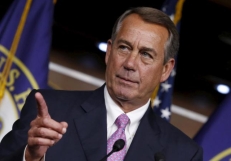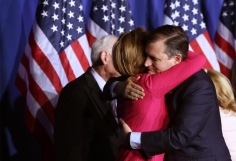Why did Cruz lose? As the dust settles over his campaign, his advisers are asking themselves what went wrong – and particularly, what went wrong with the evangelical vote.
Cruz, whose father Raphael is an evangelical firebrand preacher, campaigned on issues that ought to have brought evangelicals flocking to his banner. As well as traditional Republican positions like small government and a strong military, he spoke out on religious liberty, preferencing it over gay rights: "We want to be able to live in a world where we don't have the government dictating our beliefs and how we live. We have a right to live according to our faith and according to our conscience."
Cruz said at Bob Jones University that same-sex marriage was "not settled": "It's not the law of the land. It's not the Constitution. It's not legitimate, and we will stand and fight." He also supported North Carolina's bathroom ordinance, that aligns public restroom use to people's biological gender identity.
Cruz has spoken of his personal faith and used evangelical religious language on the campaign trail. He ticked every box for evangelical Republicans in an effort to gain their votes in the states where they could make the difference between success and failure – and they still voted for Trump.
He and his advisers must be bewildered. But there are reasons why he didn't convince. One is personal: Trump is just a more human and accessible human being. Cruz comes across as unlikeable (though he has personal friends who deny this). Another is that Cruz has a reputation for arrogant inflexibility, and this severely limited his effectiveness as a state senator.
But aside from all this, the real reasons may be much simpler. The first is this: pollsters – among them those relied on by the Cruz campaign – didn't dig down deeply enough into what evangelicalism is. A Christianity Today article makes this point very clearly. The distinction is between evangelicals who actually attend church regularly – the solid core of the evangelical constituency – who voted for people other than Trump, and those who attend much less, who voted for him. In Missouri, Cruz garnered 56 per cent of those who attended more than once a week and 50 per cent of those who attended once a week – way ahead of Trump in each case. So the more people attend church, the less likely they are to vote Trump.
It's fair to say that the others are evangelicals in name only, as people in England used to say "C of E" when they were asked for their religion even if they hadn't been to church since they were christened. It's a social badge rather than a religious one, and it says nothing about their views on gay marriage or religious liberty.
So in a sense, the Cruz strategy succeeded. He won the evangelical vote; it's just that there weren't enough real evangelicals out there for it to matter.
The second reason is even simpler. Evangelicals are not just evangelicals. They care about gay marriage and worry about finding a transgender person in a public lavatory, but they also worry about their jobs, about being able to afford to send their children to college, about healthcare and law and order.
Even the evangelical core is going to factor these concerns in, and they are unquestionably what will sway people outside that inner circle. Playing to a few dog-whistle themes is sound in theory and will get the applause at campaign rallies, but when people are alone in the ballot box their real agenda shows – and they didn't choose Cruz.
Full disclosure: I'm very, very glad Cruz lost. And if it's argued that someone from the wrong side of the Atlantic doesn't have the right to an opinion, I'd answer that nowadays we're all connected. It's a small, small world, and who sits in the White House affects me too.
Cruz and Trump are both conservatives who want to roll back big government, dismantle Obamacare, stop immigration and send illegal immigrants back home. They both use divisive rhetoric and demonise whole swathes of the population. They both use religion, too, but here there's a difference between them. Trump is nakedly opportunistic when he talks about it. Cruz really believes it. His play for the vote of religious conservatives wasn't just a tactic. These are his people, the ones he would have governed for. Americans who didn't fit the template – gay people, transgender people, for instance – had every right to feel afraid.
Of course, I don't live there. But on foreign policy, Ted Cruz frightened me more than Donald Trump ever did. He threatened to bomb Syria and Iraq and see if sand could glow in the dark. He wanted to devote four per cent of US GDP to the Pentagon. He'd have ripped up Obama's Cuba and Iran deals. Again, his rhetoric is similar to Trump's, but the difference was that Cruz is a driven man who never backs down and never listens to anyone who doesn't agree with him. Trump will negotiate; Cruz never would.
Trump will almost certainly be the Republican nominee for the presidency. Can he take it all the way? Who would have dreamed he could have come this far? No one should rule it out – and a Rasmussen poll has just put him neck and neck with Clinton.
There's no doubt that a Trump presidency would be "very challenging", as the Archbishop of Canterbury put it. There would unquestionably be embarrassing moments for the US. It might create all sorts of domestic and foreign policy issues as the rhetoric of the campaign trail came up against the realities of office. But it may not be the disaster everyone is predicting. Trump has a short attention span and a tendency to make things up as he goes along. He won't be allowed to if he's elected. He will be carried – as many presidents have been carried – by people who know what they're doing, and he may be smart enough to let them get on with it.
Cruz, on the other hand, would have taken charge – and that's a very scary thought.
Follow Mark Woods on Twitter: @RevMarkWoods

















